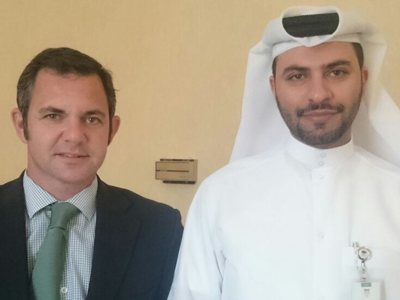Speaking in tandem, DrYousufNoman and IñigoSatrústegui of the Qatar Green Building Council describe some of the IEQ initiatives involving schools in the country
Speaking in tandem, Dr Yousuf Noman and IñigoSatrústegui of the Qatar Green Building Council describe some of the IEQ initiatives involving schools in the country

Could you please elaborate on the Qatar Green Building Council’s initiative aimed at ushering in IEQ best practices in schools in the country?
Dr Yousuf Noman: The Healthy Building Group is one among many in the Qatar Green Building Council. As a Group, we are collecting data and working towards drafting guidelines for IEQ.
We have a lack of regulation for IEQ, so we will share the results of our field study with the government. After satisfying the government, if the guidelines become regulation, it will be easy to implement in the community.
Broadly speaking, we are aligning our efforts with the Qatar National Vision 2030, which talks of health, performance and achievement. Everything we want to do with schools is aligned with the Vision.
What prompted you to work on the guidelines?
Dr Yousuf Noman: The Qatar Foundation introduced the Welfare Guideline for the Ministry of Labour. The Ministry was happy with the document and adopted and implemented the contents in the oil and gas sector and the infrastructure sector. We are hopeful the IEQ guidelines will draw similar attention.
Also, the Qatar Construction Specification 2014 is talking about building construction. It is probably related to noise level. This gave us encouragement that the country is doing something, and we want to do something in relation to IAQ.
IñigoSatrústegui: Our aim is to help the country draft regulation. We are trying to conduct a survey in a hotel, in the West Bay area of Doha, and in a school. And once we know what is going on there, we will prepare the guidelines. In Spain, where I come from, the regulation for IEQ in schools is very strict. Here, the lifestyle, climate and the construction are different. And so you have to factor in the variables and decide what to do from design, construction and O&M points of view. The guidelines will include all of these. The scope of our survey includes checking for indoor air quality, acoustic levels, accessibility, hygiene and maintenance. We are checking if the hotel and the school have any maintenance programme or schedule and, if so, how they are complying.
What will you be testing for?
Dr Yousuf Noman: We will be testing for PM 2.5 and carbon dioxide in terms of ventilation rate. We will also be testing for microorganisms. The work will include visual inspection of AHUs and checking the acoustical level in classrooms and in common areas.
The survey is going to be done during school working hours. We will check what is going on at that time. Many times, schools say they are cleaning the surfaces, but the problem is with the chemicals they use. We will check for VOCs, as well, and hopefully, get useful data. Many schools don’t have windows, and so ventilation could be an issue.
Overall, though, the aim of the survey is not to show that a particular school is not good but to recommend remedies. Within the group, we have people with different backgrounds and expertise and, hence, we can offer different technical solutions. We can look at the design and, if evaluated as not done properly, we can suggest remedial measures.
As we go along, we want to evaluate new schools and also existing buildings. We will select a few new schools and a few old schools. The guidelines may borrow from international documents, but we will look to customise the contents to make them applicable to the country. In the Middle East, we experience extremely hot temperatures in summer, and mould is an issue in July and August.
IñigoSatrústegui: The clever thing is to bring international expertise and take the parts that will benefit Qatar; the rest, we will customise.
Would you also be testing for lead level in blood?
Dr Yousuf Noman: Our study is an initiative. Maybe we can’t cover everything immediately. Our primary aim is to draft the guidelines and build awareness, so you will find a lack of coverage of some areas. Later on, we will pursue other parameters, including benzene levels and also the issue of schools in close proximity to petrol stations.
What will be the nature of the remedial measures?
IñigoSatrústegui: The Qatar Supreme Council of Health is concerned about diabetes affecting children. They are also concerned about ambient air quality. We need to look at the problem indoors, as well. It is much easier to fight contamination inside the building, because you have the technology to counter that and to say it is possible to breathe clean air no matter what the surroundings, owing to the technology available.
Could you comment on an interesting initiative by the Green Schools Group of QGBC?
Dr Yousuf Noman: The Green Schools Group has taken the initiative of technical inspection of classrooms.
They are focusing on a particular school for Bedouins outside the city. The school in question has created a sustainable campus, which includes planting trees and installing solar panels for lighting. They are also looking at ways and means to save energy and water. The school was also interested in IAQ, and we are supporting them by taking measurements in labs and interacting with students on what they would do when faced with certain circumstances.
It is an interactive project with children. And we are supporting the Green Schools Group in QGBC.
Copyright © 2006-2025 - CPI Industry. All rights reserved.